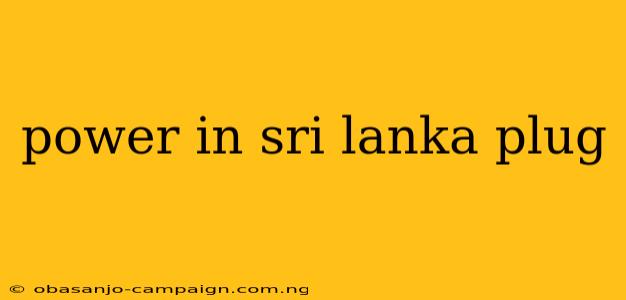Sri Lanka, a tropical island nation known for its vibrant culture and stunning landscapes, also presents a unique set of electrical requirements for visitors. Understanding the power in Sri Lanka is crucial for ensuring your electronic devices function seamlessly during your trip. This guide delves into the intricacies of Sri Lankan plugs and power outlets, equipping you with the necessary knowledge to navigate the electrical landscape of this captivating destination.
Understanding Sri Lankan Power Outlets
Sri Lanka operates on a 230-volt electrical system, which differs from the 120-volt system commonly found in North America. The country utilizes a three-pin plug configuration, known as the BS 1363 plug (also referred to as the "British standard plug"), which features a rectangular-shaped plug with three pins: a live pin (L), a neutral pin (N), and an earth pin (E).
Types of Sri Lankan Power Outlets
Sri Lanka utilizes a variety of power outlets, primarily the following:
- Type D (BS 1363): The standard three-pin outlet with a rectangular shape. This is the most prevalent type of outlet in Sri Lanka.
- Type G (BS 1363 with fused plug): While not as common as Type D, some older properties may still utilize this type of outlet. It is identical to Type D but with an integrated fuse in the plug.
Power Adapters for Sri Lanka
To use your electronic devices in Sri Lanka, you will need a power adapter that converts your device's plug type to the BS 1363 standard. Here's a breakdown of common plug types and the adapters required:
- US/Canada (Type A and Type B): Requires a Type D adapter, featuring a three-pin plug that converts your two-prong plug to a three-prong Sri Lankan plug.
- Europe/Australia (Type C, Type E, Type F, Type I): While these plugs have two round pins, they require an adapter with a grounded third pin.
- UK (Type G): You can use your existing UK plug directly in Sri Lanka as both utilize the same BS 1363 standard.
Power Converter for Sri Lanka
In addition to a power adapter, you may also need a voltage converter if your device operates on a different voltage (typically 110-120V). While many modern electronic devices are designed to handle voltage fluctuations (dual-voltage), older devices may require a converter to avoid damage.
Common Devices That May Require a Voltage Converter:
- Hairdryers
- Curling irons
- Electric shavers
- Laptops
- Cameras
Voltage and Frequency in Sri Lanka
- Voltage: 230 volts
- Frequency: 50 Hz
Tips for Using Power in Sri Lanka
- Purchase a power adapter and converter before your trip: Purchasing these items in advance ensures you're prepared upon arrival.
- Check the voltage requirements of your electronic devices: Verify if your devices are dual-voltage or require a voltage converter.
- Use surge protectors: To safeguard your electronics against power surges, consider using a surge protector.
- Be cautious with electrical outlets: Avoid overloading outlets and be mindful of potential electrical hazards.
- Consider carrying a travel power strip: A power strip can be useful for charging multiple devices simultaneously.
Power Outages in Sri Lanka
While power outages are relatively infrequent, they can occur, particularly during periods of heavy rain or thunderstorms. It's advisable to be prepared by having a backup power source like a portable power bank or flashlight.
Electrical Safety in Sri Lanka
- Avoid using electrical appliances in wet areas: Water and electricity are a dangerous combination.
- Never touch electrical wiring or exposed wires: Always contact a qualified electrician if you notice any electrical hazards.
- Be cautious of exposed wires and loose connections: Report any faulty wiring to your accommodation or property management.
- Always unplug appliances when not in use: This is a general safety precaution that helps prevent accidents.
Power in Sri Lanka - Conclusion
Navigating the power in Sri Lanka is straightforward with the right knowledge. By understanding the country's electrical system, including the Sri Lankan plugs and power outlets, and equipping yourself with the necessary adapters and converters, you can ensure your electronic devices function flawlessly during your journey. Embrace the island's captivating beauty and cultural experiences without any power-related worries, and enjoy a smooth and seamless trip.
